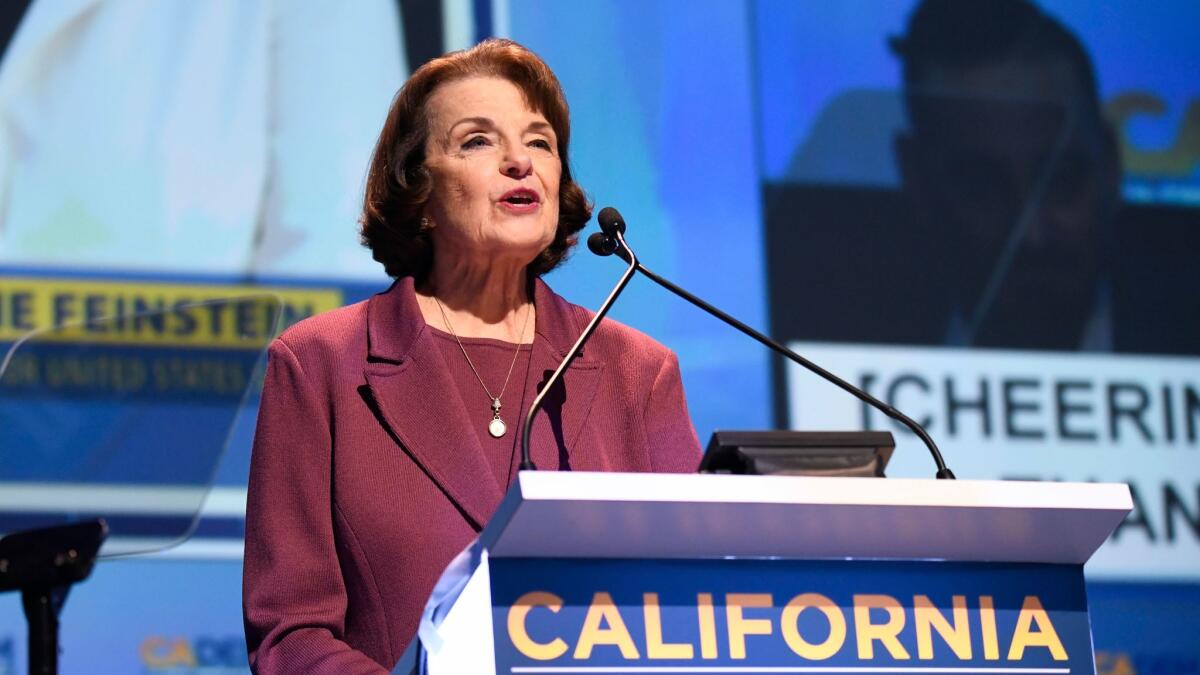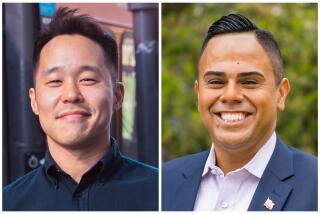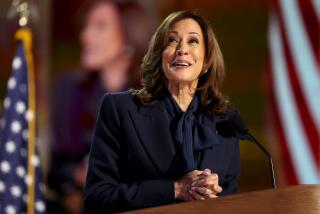Opinion: California Democrats are having an identity crisis

Is the California Democratic Party having an identity crisis?
It’s a reasonable question given that delegates at the state party’s annual convention in San Diego last weekend were so divided they couldn’t agree on whom to endorse for U.S. Senate, governor, lieutenant governor, attorney general and several key congressional seats.
Even more surprising: Not only did incumbents U.S. Sen. Dianne Feinstein and Atty. Gen. Xavier Becerra fail to get enough delegate votes to secure party endorsement, (they needed 60%) their upstart Democratic competitors got more votes. State Sen. Kevin de León received 54% of the votes to Feinstein’s 37%, and State Insurance Commissioner Dave Jones received 56% of votes to Becerra’s 42%. Ouch.
Is this a rebuke of the establishment by the progressive arm of the party, which last year came close to taking over party leadership? Or is it the influence of the millennial and Generation X members of the party frustrated that the Baby Boomer and the Greatest Generation leaders won’t hand over the reins of power and step aside?
The answer is probably some of both, though there are other things at play, such as the party’s decision to no longer automatically endorse incumbents, a bumper crop of candidates motivated by the presidential election and the state’s “jungle” primary that encourages competitive races.
Still, it’s unusual for the party to sit out so many races. And regardless of why it happened, to the average Democratic California voter, it looks like the result of a party that has lost its way just months before an important election.
Having no party endorsement in the governor’s or senate race isn’t a huge deal; it won’t stop candidates from raising money or seeking endorsements from influential political groups and people. Nor is a good indicator of how the vote will go. Party delegates’ preferences don’t necessarily align with those of the state’s voters, who can cross party lines in the state primary. And because there are significantly more Democratic voters in California, it’s all but guaranteed that one of the Democrats running, maybe two of them, will be among the top-two vote getters in the primary race and that one of them will win outright in November.
But the lack of endorsements in five congressional seats currently held by Republicans could have ramifications beyond state borders. The Democrats would like to flip the U.S. House to their control in November (and so should anyone worried about the Donald Trump presidency and the moral abdication of the GOP) and they need California’s help to do so.
The seats held by Reps. Ed Royce (R-Fullerton) and Darrell Issa (R-Vista) are good candidates for flipping. Royce and Issa are GOP stalwarts who decided not to seek reelection after their once-safe districts turned purple. A bunch of Democratic candidates jumped into both races, and there’s a danger the eager bunch will split the vote. Having the imprimatur of the party would help one candidate rise to the top, but none received enough votes at the convention to get it. If the GOP rallies around two strong candidates in those races, there’s a danger that no Democrats would be among the two top vote getters and thus be shut out of the general election in November.
That’s a real possibility because Republican Party seems to exercise better control over its candidates. Here’s a good example: On Monday, one of the three GOP candidates for governor, former Congressman Doug Ose, dropped out of the race, citing a crowded field. Since Ose only jumped into the race last month, he knew full well the field was crowded. I‘d bet he had some help deciding to bow out.
But heavy handedness won’t fly in the state’s Democratic Party. In fact, the current split has been driven in part by resentment of the chokehold he party has on the candidate pipeline. But California’s Democratic Party leaders and members have to get it together and figure out who they want to be collectively before June 5. There’s more riding on it than just the outcome of a few congressional seats.
Follow me @marielgarzaLAT
More to Read
A cure for the common opinion
Get thought-provoking perspectives with our weekly newsletter.
You may occasionally receive promotional content from the Los Angeles Times.











